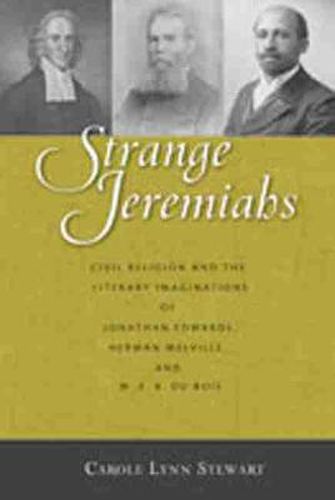Readings Newsletter
Become a Readings Member to make your shopping experience even easier.
Sign in or sign up for free!
You’re not far away from qualifying for FREE standard shipping within Australia
You’ve qualified for FREE standard shipping within Australia
The cart is loading…






Examines the work of three major American authors - Jonathan Edwards, Herman Melville and W.E.B. DuBois - whose lives span 250 years and who, in spite of their different heritages, all expressed themselves through the tradition of the jeremiad. The study is grounded in the meaning and act of America’s revolutionary founding, the Civil War, and in Reconstruction and offers new resources for understanding American history and culture.|Over the last few decades the notion of civil religion has gained parlance as a way of making sense of American culture and religion. The term civil religion, often used simply to mean patriotism, refers in this text to the religious styles and rhetoric that emerge from the act of founding of the American Republic as a democratic nation. The author examines the work of three major American authors whose lives span 250 years and who, in spite of their different heritages, all expressed themselves through the tradition of the jeremiad, or prophetic judgment of a people for backsliding from their destiny. Jonathan Edwards, the eighteenth-century theologian whose work defined the Great Awakening, made use of the jeremiad through a theological discourse that defined conversion as a performative act. Stewart demonstrates how Herman Melville, the author of Moby Dick, questioned the ideology of American optimism; her focus here falls upon his lesser known and often overlooked novel, Pierre, or the Ambiguities. W. E. B. Du Bois, the preeminent African American intellectual and activist took up the jeremiad from the implications of the Reconstruction. Stewart grounds her study in the meaning and act of America’s revolutionary founding, the Civil War, and in Reconstruction, which represents a refounding. These contexts along with the cultural meaning of Puritanism set forth the meaning of civil religion within the orders of a revolutionary beginning. Highlighting the promise and failure of the American Revolution, her study offers new resources for understanding American history and culture.
$9.00 standard shipping within Australia
FREE standard shipping within Australia for orders over $100.00
Express & International shipping calculated at checkout
Examines the work of three major American authors - Jonathan Edwards, Herman Melville and W.E.B. DuBois - whose lives span 250 years and who, in spite of their different heritages, all expressed themselves through the tradition of the jeremiad. The study is grounded in the meaning and act of America’s revolutionary founding, the Civil War, and in Reconstruction and offers new resources for understanding American history and culture.|Over the last few decades the notion of civil religion has gained parlance as a way of making sense of American culture and religion. The term civil religion, often used simply to mean patriotism, refers in this text to the religious styles and rhetoric that emerge from the act of founding of the American Republic as a democratic nation. The author examines the work of three major American authors whose lives span 250 years and who, in spite of their different heritages, all expressed themselves through the tradition of the jeremiad, or prophetic judgment of a people for backsliding from their destiny. Jonathan Edwards, the eighteenth-century theologian whose work defined the Great Awakening, made use of the jeremiad through a theological discourse that defined conversion as a performative act. Stewart demonstrates how Herman Melville, the author of Moby Dick, questioned the ideology of American optimism; her focus here falls upon his lesser known and often overlooked novel, Pierre, or the Ambiguities. W. E. B. Du Bois, the preeminent African American intellectual and activist took up the jeremiad from the implications of the Reconstruction. Stewart grounds her study in the meaning and act of America’s revolutionary founding, the Civil War, and in Reconstruction, which represents a refounding. These contexts along with the cultural meaning of Puritanism set forth the meaning of civil religion within the orders of a revolutionary beginning. Highlighting the promise and failure of the American Revolution, her study offers new resources for understanding American history and culture.